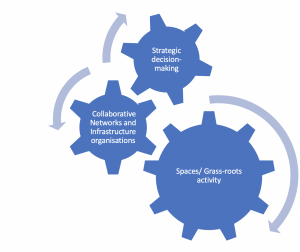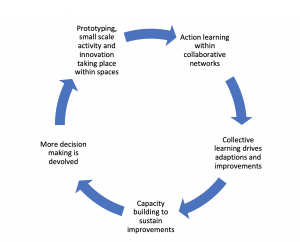Systems maps are one way to help explain something as intimate as a small organization or as big and complex as a society such as a place.
When you look at a systems map, you see that one factor influences another, which reinforces another and so on until the loop closes in on itself and sometimes becomes self-perpetuating. Different loops interact to help explain how a community thrives or declines. One way to improve life in Greater Manchester is to understand how the parts fit together and find ways to break out of negative-feedback loops and to reinforce virtuous loops.
Systems maps try to prevent simple problem-solving. In a complex society, it is a bad idea to break complex situations in easy-to-manage chunks and then try to solve the isolated problems. Life in Greater Manchester is characterised by constantly evolving relationships within our society. Trying to fix one piece may not make things better if it fails to account for these connections.

| Spaces and grass-roots activity | The places where people come together, at a local level and on their own terms, to explore what it means to reveal, question and dismantle systems that perpetuate disadvantage. In these spaces collaborative leadership will be promoted and open, trusting relationships will be formed and strengthened. Some of the existing spaces we work with are situated within the Elephants Trail, Justlife, Our Agency, Rapar, SAWN, Synergi, Unlimted potential, Culture Hack Labs & Whose Knowledge and the LGBT Foundation. |
| Collaborative networks | Places where we can come together to review the learning from the activity taking place within the spaces. As well as our own learning space we will be working alongside the Support and Action Women’s Network, the Support and Action Women’s Network, the Homelessness Action Network, the Health and Social Care coproduction network, the Greater Manchester movement for social change, the Greater Manchester food poverty alliance and the Greater Manchester Mutual Aid network, 10GM and the Greater Manchester funders forum.
Pieces of work which are currently taking place within these networks include Legislative Theatre, These collaborative networks form the social infrastructure needed to bring about and sustain systemic change. They can help to uncover leverage points (the parts of the system where a small shift in one thing can produce big changes), strengthen the case for investment and funding in the grass roots activity, provide spaces (both digital and physical) where the grass roots groups can collaborate and develop a shared vision. These networks will help to create a critical mass of people who want to change the systems which perpetuate severe and multiple disadvantage and help them bring in the resources they need to do so. |
| Strategic decision making | These are the spaces in which decisions about resource allocation are currently made. We want to make these spaces less exclusive and ensure we move beyond dialogue with people experiencing severe and multiple disadvantage and in to shared decision-making power and where everyone has permission to act, where those closest to a situation have the resources to use their initiative to respond to it.
The strategic decision-making spaces in which we will be operating as part of this work include the homelessness programme board, the Greater Manchester Inequalities Commission, |

